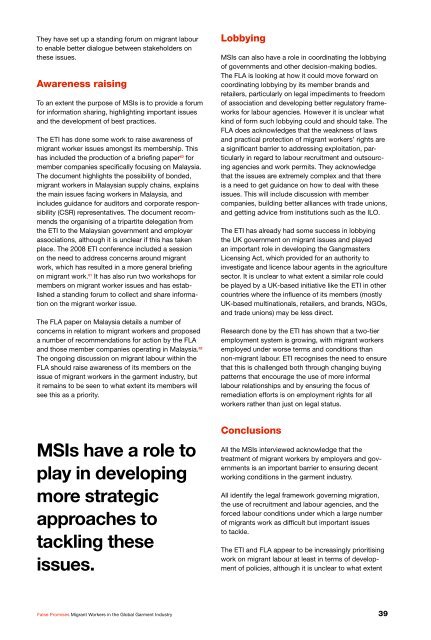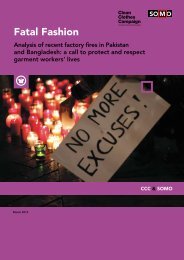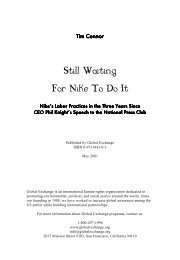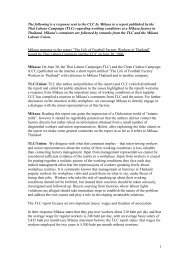You also want an ePaper? Increase the reach of your titles
YUMPU automatically turns print PDFs into web optimized ePapers that Google loves.
They have set up a standing forum on migrant labour<br />
to enable better dialogue between stakeholders on<br />
these issues.<br />
Awareness raising<br />
To an extent the purpose of MSIs is to provide a forum<br />
for information sharing, highlighting important issues<br />
and the development of best practices.<br />
The ETI has done some work to raise awareness of<br />
migrant worker issues amongst its membership. This<br />
has included the production of a briefing paper 60 for<br />
member companies specifically focusing on Malaysia.<br />
The document highlights the possibility of bonded,<br />
migrant workers in Malaysian supply chains, explains<br />
the main issues facing workers in Malaysia, and<br />
includes guidance for auditors and corporate responsibility<br />
(CSR) representatives. The document recommends<br />
the organising of a tripartite delegation from<br />
the ETI to the Malaysian government and employer<br />
associations, although it is unclear if this has taken<br />
place. The 2008 ETI conference included a session<br />
on the need to address concerns around migrant<br />
work, which has resulted in a more general briefing<br />
on migrant work. 61 It has also run two workshops for<br />
members on migrant worker issues and has established<br />
a standing forum to collect and share information<br />
on the migrant worker issue.<br />
The FLA paper on Malaysia details a number of<br />
concerns in relation to migrant workers and proposed<br />
a number of recommendations for action by the FLA<br />
and those member companies operating in Malaysia. 62<br />
The ongoing discussion on migrant labour within the<br />
FLA should raise awareness of its members on the<br />
issue of migrant workers in the garment industry, but<br />
it remains to be seen to what extent its members will<br />
see this as a priority.<br />
MSIs have a role to<br />
play in developing<br />
more strategic<br />
approaches to<br />
tackling these<br />
issues.<br />
False Promises Migrant Workers in the Global Garment Industry<br />
Lobbying<br />
MSIs can also have a role in coordinating the lobbying<br />
of governments and other decision-making bodies.<br />
The FLA is looking at how it could move forward on<br />
coordinating lobbying by its member brands and<br />
retailers, particularly on legal impediments to freedom<br />
of association and developing better regulatory frameworks<br />
for labour agencies. However it is unclear what<br />
kind of form such lobbying could and should take. The<br />
FLA does acknowledges that the weakness of laws<br />
and practical protection of migrant workers’ rights are<br />
a significant barrier to addressing exploitation, particularly<br />
in regard to labour recruitment and outsourcing<br />
agencies and work permits. They acknowledge<br />
that the issues are extremely complex and that there<br />
is a need to get guidance on how to deal with these<br />
issues. This will include discussion with member<br />
companies, building better alliances with trade unions,<br />
and getting advice from institutions such as the ILO.<br />
The ETI has already had some success in lobbying<br />
the UK government on migrant issues and played<br />
an important role in developing the Gangmasters<br />
Licensing Act, which provided for an authority to<br />
investigate and licence labour agents in the agriculture<br />
sector. It is unclear to what extent a similar role could<br />
be played by a UK-based initiative like the ETI in other<br />
countries where the influence of its members (mostly<br />
UK-based multinationals, retailers, and brands, NGOs,<br />
and trade unions) may be less direct.<br />
Research done by the ETI has shown that a two-tier<br />
employment system is growing, with migrant workers<br />
employed under worse terms and conditions than<br />
non-migrant labour. ETI recognises the need to ensure<br />
that this is challenged both through changing buying<br />
patterns that encourage the use of more informal<br />
labour relationships and by ensuring the focus of<br />
remediation efforts is on employment rights for all<br />
workers rather than just on legal status.<br />
Conclusions<br />
All the MSIs interviewed acknowledge that the<br />
treatment of migrant workers by employers and governments<br />
is an important barrier to ensuring decent<br />
working conditions in the garment industry.<br />
All identify the legal framework governing migration,<br />
the use of recruitment and labour agencies, and the<br />
forced labour conditions under which a large number<br />
of migrants work as difficult but important issues<br />
to tackle.<br />
The ETI and FLA appear to be increasingly prioritising<br />
work on migrant labour at least in terms of development<br />
of policies, although it is unclear to what extent<br />
39





